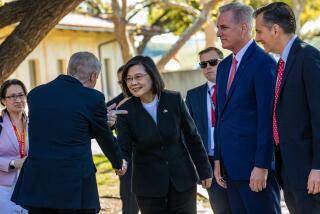Taiwan Pours Money Into South China Area : Trade: Island capitalists are shaking off decades of political restraints. Their largesse is making up for Western sanctions against Beijing.
- Share via
TAIPEI — Fujian province, just across the Taiwan Strait in socialist China, has become the hot place for this island’s money-laden capitalists to invest.
Hungry for places to put the proceeds of Taiwan’s 40-year boom, thousands of entrepreneurs, industrialists, investors and traders are shaking off political restraints that have held them back for decades: They are making pilgrimages not only to Fujian but also to Beijing to seek further fortunes on the mainland.
“Mainland investments have become a vogue here, and Fujian is the place of choice,” an American economist said. “Many Taiwan businessmen speak the Fujianese dialect and feel at home in that part of South China.”
Investments and trade in Fujian are turning the province into a second South China window on the modern world, one that has the potential to outstrip Guangdong, where the spillover benefits from Hong Kong’s prosperity have created China’s fastest-growing provincial economy.
They also promise to turn Taiwan, like Hong Kong, into a goose that lays golden eggs for the mainland. That would provide Taiwan with new protection against “reunification” ambitions in Beijing.
Economists here and in Beijing say travelers from Taiwan and business with the island have been major factors in softening the loss of Western tourist dollars and the impact of Western economic sanctions on China since the demonstrations at Tiananmen Square became bloody last June.
Fujian seems to have become so hooked on Taiwan investment and trade in the three years since it became legal for people here to make “family” visits to the mainland that the provincial government sometimes resists edicts issued by the hard-liners in power in Beijing.
Foreign analysts in Beijing say the Fujian provincial government, eager to retain reforms that attract Taiwan business, has formed a de facto alliance with Ye Xuanping, the reformist governor in Guangdong who often resists Beijing’s drive to reverse key economic changes of the 1980s.
“It’s a certainty that Taiwan investments and Taiwan trade are already the driving forces that have raised Fujian above average Chinese provincial growth levels,” an American economist here said.
“Nobody knows how much Taiwan money has been invested in Fujian. The government here still requires that investments and even most trade be technically “indirect”--conducted through entities in Hong Kong, Singapore or elsewhere.
Now even that rule is under intense pressure, as bigger and more powerful Taiwan business interests seek ever-bigger deals with the mainland.
The biggest deal known to be in the works is a plan by Formosa Plastics, the island’s biggest petrochemical company, to build a multibillion-dollar complex across the strait in Fujian’s Xiamen special economic zone.
That project alone would dwarf the biggest of Hong Kong’s investments in Guangdong province, which consist mainly of hotels and small textile and electronics factories.
Y. C. Wong, Formosa Plastics’ chairman, has traveled to the mainland several times. Last month, he met with Deng Xiaoping, the senior leader, during a trip to Beijing.
Wong is said to have Deng’s approval to undertake the petrochemical project as a wholly owned investment. That would make it the biggest outside enterprise ever permitted on the mainland without a local partner under a “joint venture” arrangement.
With the plastics factories and other enterprises it is expected to spawn downstream, the Formosa Plastics project would become by far the largest source of non-government jobs in Fujian province.
The project is typical of investments that Taiwan entrepreneurs want to make in Fujian--essentially “sunset industries” that are losing their viability because of Taiwan’s rising labor costs.
The need to find new production bases for these industries and to find new places to put decades of profits to work has made Taiwan the fastest-growing source of potential investment for such developing countries of Southeast Asia as Indonesia, Malaysia, Thailand and the Philippines.
Wong, whose talks with Deng and other Chinese leaders have prompted expressions of concern at high levels of government in Taipei, is not alone in deciding he won’t wait for official approval.
Taiwan’s government officially acknowledges that trade with the mainland has passed $3.5 billion a year.
Taipei has repeatedly been forced to liberalize rules for travel to the mainland. In March, 1989, it set up rules for business travel, regularizing what had already been going on for nearly two years under the rubric of “family visits.”
Legally, these trips are still required to follow routes through Hong Kong or some other third jurisdiction. But some businessmen here are betting that even that remaining bit of political theater won’t last indefinitely.
Last month, an “unofficial” delegation representing Taiwan’s smaller domestic airlines went to Beijing to discuss prospects for direct air links with the mainland. When such links are opened, Fujian province stands to be one of the first and busiest destinations.
The traffic at stake is substantial.
More than a million passengers are expected to make the round trip between the island and the mainland this year, even though hundreds of thousands will have to start in the wrong direction, flying to the Philippines to make connections on international airliners.
Most analysts believe that the convenience of regular direct service, which both the mainland and Taiwan could treat as domestic flights, would multiply that traffic several times over.
More to Read
Sign up for Essential California
The most important California stories and recommendations in your inbox every morning.
You may occasionally receive promotional content from the Los Angeles Times.













